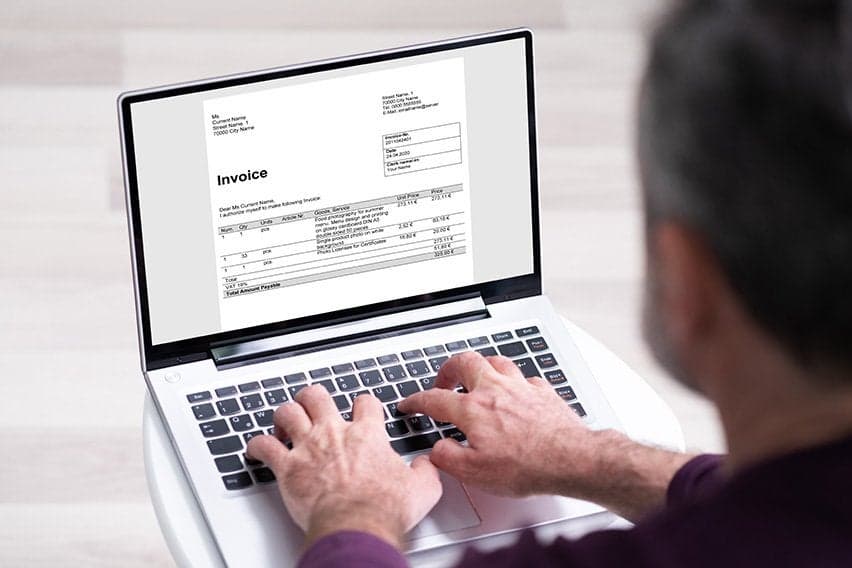Avoid Legal Trouble: 6 Key Pieces of Information Every Invoice Should Have
Updated on October 25, 2025 | 5 min. read
When a client ask me how to avoid legal trouble in their invoice, they’re usually asking about one thing: how to make sure they get paid for the work they do.
After all, there’s nothing worse than chasing payments. It consumes the valuable time you can dedicate to other projects. What’s more, the uncertainty can lead to many sleepless nights.
Readers of this blog certainly appreciate how FreshBooks takes the hassle out of invoicing, but you might be wondering if there’s anything you can include in your invoice to make it more binding and ensure you’ll get paid on time…or get paid period.
The simple answer is that there’s no foolproof legal clause that will guarantee payment: a ghost client will probably be a ghost client no matter how carefully you word your invoice. That said, there are a few things you can do to make your invoice more ‘enforceable’ to ensure you get paid for the hard work you do.
1. The Correct Billing Contact
You may have been working day-in and day-out with Bob Smith, but that doesn’t mean he’s the one in charge of billing. Depending on the size of your client’s company, they may have an accounting department. That means your primary point of contact merely forwards your invoice to the person who handles billing. So if your primary contact is overloaded or on vacation, your invoice could end up stranded in their inbox.
From the moment you land the project, ask for the contact details of whoever is responsible for paying you. Typically, it’s easier if you deal with this individual directly, and cc to your primary point of contact. This way you’ll know that accounting has actually received your invoice—and it might be easier to follow up on late payments with them directly.
2. A Unique Identification Number in Each Invoice
Create some kind of numbering system for organizing your invoices. This could be a basic numbering system that begins with 001 or it could be by date (e.g. 08142017). This will help you keep your invoices organized for tax purposes. A good invoice numbering system will also make things easier (and a heck of a lot more professional) should you need to follow up with a client on a late invoice. Take it from me, you will sound more serious when asking for the status of Invoice 0032 rather than “that invoice I sent two Thursdays ago.”
3. Matching Invoice Terms and Contract Terms
When it comes to invoicing clients, you need to make sure that all the information matches the details spelled out in your contract. For example, if your contract says your terms are net 30, you can’t ask to be paid upon receipt of your invoice. And if you’re not using a contract that includes payment terms, you’ll want to change that immediately.
4. Any Essential Details Requested by Your Client
In some cases, companies will have specific requirements for what information must be present on an invoice. For example, some clients will require that your invoice includes your Tax ID number (or social security number). Or, you may need to include a detailed rundown on the services you’re billing for. Others might specify that invoices should be sent electronically or via snail mail. Not having the right information on your invoice will delay payment, so it’s always best to ask up front if they have specific needs.
5. Date and Terms of Payment
Every invoice should include the date of issue and articulate the terms of payment. The exact terms you use are up to you and your client, but here are a few suggestions:
A proactive approach is always the best way to ensure your invoices will be paid on time.
- FreshBooks did some interesting research about payment terms and their impact on the likelihood and time to get paid. Based on that study, something like the following is optimal language: “Thank you – we really appreciate your business! Please send payment within 21 days of receiving this invoice.”
- Be as clear and specific as possible. Not all clients will know what the term “Net30” means. Saying “within 30 days” (or even writing out the specific due date) will be easier to understand for everyone.
- Avoid using “Due upon receipt” whenever possible (unless you’ve discussed this with your client beforehand). You might think this language will help you get paid faster, but not specifying an actual deadline can backfire; some clients may interpret it as “pay whenever you can.”
6. Billable Services Specifics
Each invoice line should specify the exact services that are being billed. If the client is being charged a flat rate for services, you need to specify what they’ve received (use your best judgment to determine the level of detail that’s needed). Alternatively, if you are billing by the hour, specify the hourly rate, the number of hours billed, and what they’ve received for that time.
It’s tempting to breeze through this part of the invoice, but try to be as clear and thorough as possible; it’s a good opportunity to remind your client about how much value you’ve delivered.
Final Thought: To Avoid Legal Hot Water, Always Discuss Payment Terms Up Front
A proactive approach is always the best way to ensure your invoices will be paid on time. Discuss your payment terms in early conversations with clients. You don’t need to sound like a tough lawyer here – a simple comment question like “My other clients pay me within 21 days of completing the project. Will that work for you?” will suffice. If you notice any red flags in their reaction, trust your gut and move on. In addition, always include payment terms in your contract; this will make it much easier to pursue a payment should things go wrong.











